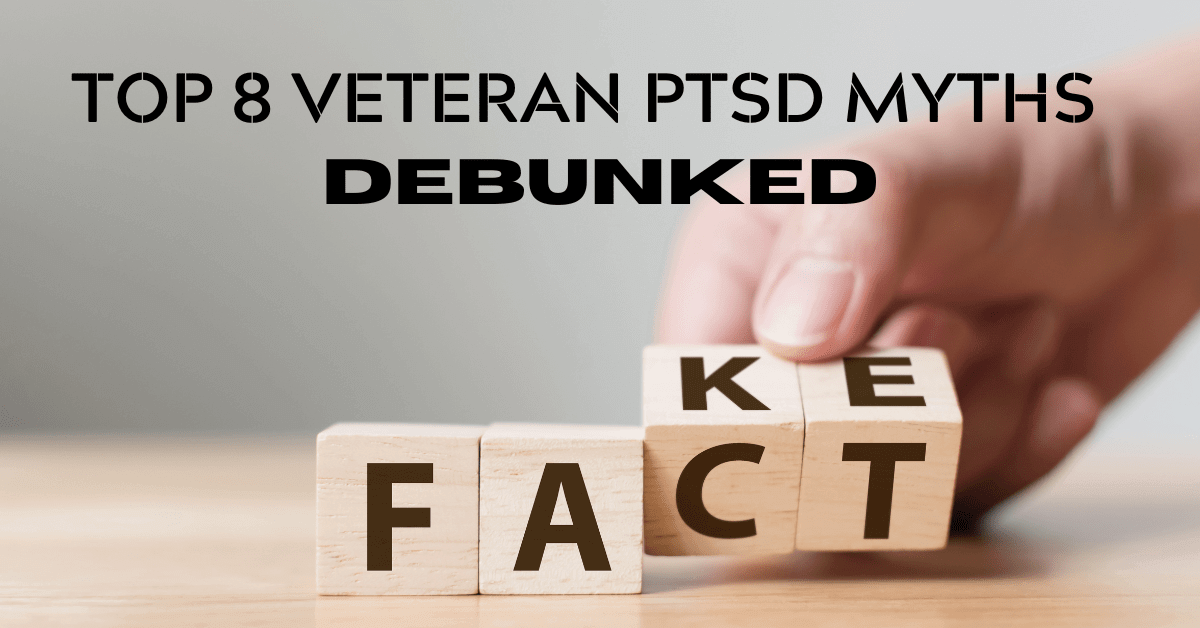The Veterans’ Administration estimates that 10% of Vietnam Veterans and 30% of Veterans from Iraq and Afghanistan suffer from PTSD. Veterans who have served in combat often experience flashbacks, nightmares, anxiety, depression, or guilt. It can be challenging for Veterans to return to their life before they were deployed because there are so many misconceptions about the condition. We want to debunk eight common myths about Veterans with PTSD.
MYTH #1. Veterans with PTSD are extremely dangerous to others..
Veterans with PTSD are not usually dangerous to others. In fact, according to returningveterans.org, “Those who have PTSD are not inherently dangerous or violent. The media has propelled the biased perspective that those with PTSD are unsafe or are prone to violence, but this isn’t necessarily true.” The hidden wounds of war are injuries too, but they don’t intrinsically cause someone to express violent actions. Veterans who have been diagnosed with PTSD often feel guilty about the things they’ve seen and done during combat. They don’t ask for help because of this guilt therefore changing the narrative around seeking help for PTSD symptoms can only improve the narrative.
MYTH #2. Veterans with PTSD cannot be helped.
Veterans can definitely benefit from getting treatment for their condition, whether it comes in the form of traditional therapy, medications or from Complementary and alternative medicine (CAM). Many Veterans find relief from symptoms as simple as acupuncture or meditation. CAM approaches are providing many Veterans with relief from their symptoms without the side effects of medications and with less talking in psychotherapy.
MYTH #3. Veterans with PTSD cannot feel love or happiness ever again.
This statement is simply untrue. Veterans with PTSD have the same capacities to feel happy, sad, and other emotions as everyone else. While it might seem like the symptoms of PTSD are overwhelming at times and can sometimes cause us to think we cannot feel happy again. With the proper treatment, plan, or medications, Veterans can still experience emotions such as happiness.
MYTH #4. Veterans with PTSD should always be on medications.
This myth perpetuates a negative connotation about the success of PTSD treatment. Medication may help Veterans cope with their symptoms and feeling better overall, but that does not mean Veterans have to rely on medication forever. Veterans can learn how PTSD affects them and find a treatment that works for them, including medications or something else such as therapy or exercise.
MYTH #5. All Veterans solely get their healthcare from the government.
In reality, according to the Returning Veterans Project, about 50% of Veterans are enrolled in the U.S. Department of Veterans Affairs healthcare. This means the other 50% of Veterans are seeking healthcare somewhere else or not at all. Veterans can access private medical facilities and pay for their own healthcare. Still, they can also participate in VA Healthcare, free to Veterans with PTSD or another service-connected disability.
MYTH #6. Veterans should be able to “just get over it” by themselves.
PTSD is a mental illness that should not be taken lightly. Veterans not only have to deal with PTSD, but they also must work through other mental health issues such as depression that are often associated with PTSD. Veterans should receive the help they need without feeling embarrassed or ashamed of their condition. According to the American Institute for Research, upwards of 63% of returning Veterans say they would not seek help from mental health professionals because they believe it would negatively affect their military or civilian careers. There is clearly still a stigma surrounding mental health care despite the American Psychological Association showing that psychological interventions are a proven and effective way of preventing lifelong effects of PTSD.
MYTH #7. Veterans only get PTSD if they served in direct combat roles.
Veterans returning from combat zones often experience symptoms of stress, anxiety, and depression regardless of whether or not they served in direct combat roles, according to the National Center for Post-Traumatic Stress Disorder (NCPTSD). This is because even non-combat military Service Members witness unspeakable violence that oftentimes leaves them feeling afraid, shocked, powerless, and isolated, just like combatants do. These adverse reactions can lead directly to long-term effects such as social withdrawal, isolation, and/or suicidal thoughts.
MYTH #8. Veterans are unreliable due to their PTSD.
Many people don’t realize how many mental illnesses exist within our country today, not only for our civilian population but also for Veterans; therefore, Veterans should not be stigmatized. The media portrayal of Veterans with PTSD has led some people to believe that Veterans are unreliable because they have PTSD. However, a study done by the CDC shows that more than 21 million Veterans were living in America during 2015-2016, which is over nine percent of the total population at the time. This means it’s likely for someone to know a Veteran who has been diagnosed with PTSD whether they realized it or not – just like one knows an individual coping with ADHD without realizing what their condition fully entails.
While there are many myths surrounding Veterans with PTSD we hope in reading this blog you learned why Veterans with PTSD aren’t as unreliable or dangerous as most people think. While Veterans have been affected by their service and experiences in the military, they should not be discriminated against. Veterans who were at one time fighting for their country and fellow citizens deserve the utmost respect and opportunities. Veterans are not just Veterans of war but also Veterans of civilian life. Returning to civilian life can be difficult enough without the stigmas and myths floating around. It is time to change the narrative about the way we think about Veterans who suffer from PTSD. Debunking these myths is just the first step.
Veterans are Veterans because of the service they provided to their country and fellow citizens. Cultural stigmas can create a lot of false narratives about Veterans who suffer from PTSD, but it is important for people not to judge Veterans before getting all the facts. The effects that Veterans experience in war may be just as traumatic when returning home after their tour of duty. However, they should never be discriminated against or looked down upon because of an invisible wound in actuality, they deserve respect and opportunities. A Veteran is so much more than someone who was once fighting on behalf of our nation; Veterans are also civilians with everyday lives after serving this great nation through military campaigns.






